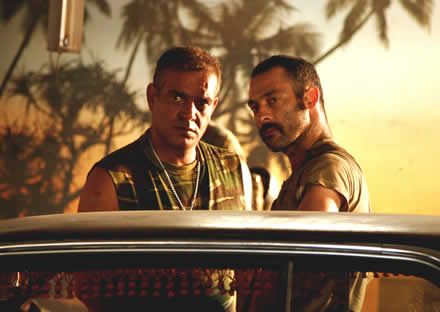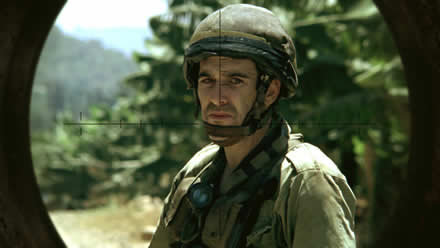The First Lebanon War – June, 1982. A lone tank is dispatched to search a hostile town that has already been bombarded by the Israeli Air Force. What seems to be a simple mission gradually spins out of control.
Shmuel the gunner, Assi the commander, Herzl the loader and Yigal the driver are the tank’s crew, four 20-something boys who have never fought in a war and are now operating a killing machine. Though trying to remain brave, the boys are pushed to their mental limits as they struggle to survive in a situation they cannot contain, and try not to lose their humanity in the chaos of war.
Writer-director Samuel Maoz’s Lebanon is based on his own experiences as a twenty year old novice soldier serving in the Israeli army during the 1982 Lebanon war. Using his own vivid recollections to bring us inside an Israeli tank during the first 24 hours of the invasion, Maoz restricts the film’s action entirely to the tank’s interior and shows us the outside world only—as the four young soldiers themselves see it—through the lens of a periscopic gun sight. The cathartic process of writing and directing LEBANON allowed Maoz to finally free himself of the events that he had experienced twenty-five years earlier.
Bijan Tehrani: Are the events in Lebanon based on your own personal experiences?
Samuel Maoz: It’s all about my own personal experience; it is my exact true personal story. For me the making of Lebanon was a need, it was a general a need for me to unload and to maybe forgive myself and find some understanding. I felt that I had a responsibility to tell this story; and to tell this story about this no way out situation and to show that these soldiers did not have a choice in doing the things that they did but yet they still feel responsible and guilty. I never spoke of these events for 25 years, I guess that is in regard to my generation that people call the Lebanon Generation. Some of our people came straight from the German camp and I remember the people that came; even my teacher I remember that she had the numbers on her arm from a concentration camp and she used to preach to us about how we had to be willing to fight and die for our country. When we were kids we weren’t thinking that everyone wanted to exterminate us, we were thinking about television, the beach and girls; so I guess in a way you could say that we were brain washed. They used to tell us to thank god that we were alive because our elders came straight from the camp. So I guess that what triggered me was the second Lebanon war and I feel that I had to tell this story to the younger generation because they are going through the same thing now. Even when I saw Apocalypse now, which is a great film, but yet I still felt some kind of romanticized vision of the war, and in reality war is total hell.
BT: Lebanon has a very real approach in terms of its depiction of war; can you further explain the way war is depicted in Lebanon?
SM: I decided that I did not want to just tell a story but I wanted to create an experience of feeling. I remember that when I started to write that I wanted to have a very basic plot, something that  you could tell in seven or eight line. The issue was the bleeding soul or what is going on inside the soul of a soldier during the times of war. I assumed that the only way to deliver it or explain it to someone who did not live through it, would be to not talk through the head but rather through the stomach and the heart. So I said that I would put the audience inside of the tank and you would see only what soldiers inside the thank can see and know only what they know. I wanted the audience to really feel it, to sit in the gunner’s seat to see the victims staring you in the eyes. “Feeling” is essential for understanding and I feel that this is the key to telling an effective story.
you could tell in seven or eight line. The issue was the bleeding soul or what is going on inside the soul of a soldier during the times of war. I assumed that the only way to deliver it or explain it to someone who did not live through it, would be to not talk through the head but rather through the stomach and the heart. So I said that I would put the audience inside of the tank and you would see only what soldiers inside the thank can see and know only what they know. I wanted the audience to really feel it, to sit in the gunner’s seat to see the victims staring you in the eyes. “Feeling” is essential for understanding and I feel that this is the key to telling an effective story.
BT: How did you go about casting the film?
SM: When I did the auditions, I tested their eyes and their stares. There is less than 30% dialogue in the film Lebanon. When you are dealing with such an extreme situations and conflicts, you really can’t express them with words. I needed to trust the eye and the body language of the actors. After I chose them I knew that I needed to prepare them in a very special way. The first step was to let them understand what was to be inside of the tank; so instead of explaining it to them I took each one of them separately and locked them in a small dark and hot container. After two hours in those extreme conditions the body starts to contain itself; we then started to bang on the container an this simulated an attack on a tank. After this we would take the actor out and juts look at their eyes and there in their eyes was war.
BT: How was the reaction to Lebanon in Israel?
SM: Well Israel was the most complicated place, but the reaction in Israel was much more positive than negative. When we analyzed the reaction it showed that the older members of the audience reacted negatively in the sense that the older mothers would not want to send their sons to the army.
BT: How was the Palestinian & Arab response to the film?
SM: I met many Arabs from Lebanon, Syria, Iraq and people from Iran and in my screening in Europe, their reactions were very positive because I believe that they captured the humanistic message. A professor from Beirut University sent me an e-mail and asked me to send him a DVD copy for an underground screening. He told me that he had a screening in his house and invited people from the University and the film scene, and each of them wrote me a few words about the film and it was the most exciting e-mail I ever got.
BT: It was very interesting how you dealt with the characters in the film, why did you choose not to judge any of the characters in the film. May be the only character portrayed rightly in a negative light is the Phalange guy.
SM: I tried not to judge the characters because in the war the men are all good guys and the war is the bad guy. Everyone is a victim of the war itself. My feeling is not historically true; you cannot tell a historical film from a personal point of view. This is very light version of what they did in front of my eyes. When I was in an airport I witnessed a Muslim man being ripped apart alive by Phalanges by a pair of cars; but I still do not judge people because soldiers are just following orders. People do not want to kill because it is not natural to kill. When you are in war you cannot think within the logic of normal life because if you do you will not survive; when you are in war you are not thinking of the hour ahead you are just thinking of surviving.
BT: What other projects do you have lined up?
SM: I have two projects lined up, one is another film about war and the other is something totally different, it is a black comedy.

